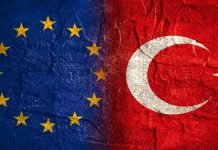Turkish police investigated 14,186 social media accounts in the first seven months of 2020, taking legal action against 6,743 of them on charges of spreading terrorist propaganda, inciting the public to hatred and enmity, instilling fear in and causing panic among the public or containing provocative content, Turkey’s Interior Ministry announced in a statement on Friday.
The cybercrimes department of the Turkish National Police and its branches across the country have been monitoring the Internet 24/7, the statement added.
Out of the 6,743 social media accounts against which legal action has been taken, 3,948 are linked to the faith-based Gülen movement, a dissident group designated as a terrorist organization and referred to derogatorily as Fethullahist Terrorist Organization (FETO) by the Turkish government; 2,552 are linked to the outlawed Kurdistan Workers’ Party (PKK), a militant group that has been waging an insurgency against the Turkish state since 1984; 157 are linked to the Islamic State in Iraq and Syria (ISIS); and 86 accounts are linked to the outlawed leftist Revolutionary People’s Liberation Party/Front (DHKP/C), the statement said.
Criticizing the government on social media platforms is heavily sanctioned in Turkey, sometimes triggering a counterterrorism investigation. Between January 1 and April 9, 2019 Turkish authorities examined 10,250 social media accounts and took legal action against more than 3,600 users, accusing them of propagandizing for or promoting terrorist organizations, inciting persons to enmity and hostility, or insulting state institutions, a report by the US State Department indicated.
Turkey is also notorious for removing dissident content on social media. A report drafted by the Freedom of Expression Association (IFÖD) showed that Turkey made the highest number of applications to Twitter for content removal in the first half of 2019.
According to a report titled “EngelliWeb 2019” (BlockedWeb 2019), Twitter received a total of 50,757 removal requests in the first six months of 2019, 8,993 of which were made by Turkey, the highest number submitted by a single country.
These interventions have increased in the wake of a failed coup in Turkey in July 2016. The ruling Justice and Development Party (AKP) launched a crackdown on critical media outlets and dissidents under the pretext of suppressing any future coup attempts. This has led to dozens of critical journalists and writers being sent to prison and the closure of hundreds of media outlets in the country.
As part of the crackdown on critical voices, the Turkish Parliament recently enacted a new social media law that allows the government to assert more control over social media. Under the legislation, social media companies with more than 1 million connections a day are required to maintain offices in Turkey. If the companies fail to comply, they will face fines and the possibility of having their bandwidth slashed to the point where people in Turkey will not have any meaningful access to the sanctioned site.
The law also obligates social media platforms to respond within 48 hours to complaints about “violations of personal rights” and to judicial orders to remove content.
The legislation was criticized by human rights defenders and critics including Amnesty International, Human Rights Watch, Reporters Without Borders and the UN, all of which expressed their concerns over the government’s move.
















[…] in Egitto e in molti altri paesi che vivono una profonda propagazione e repressione del dissenso, come la Turchia e il Kurdistan. Le pagine che informavano sull’invasione turca del Rojava sono stati chiuse o sospese ovunque […]